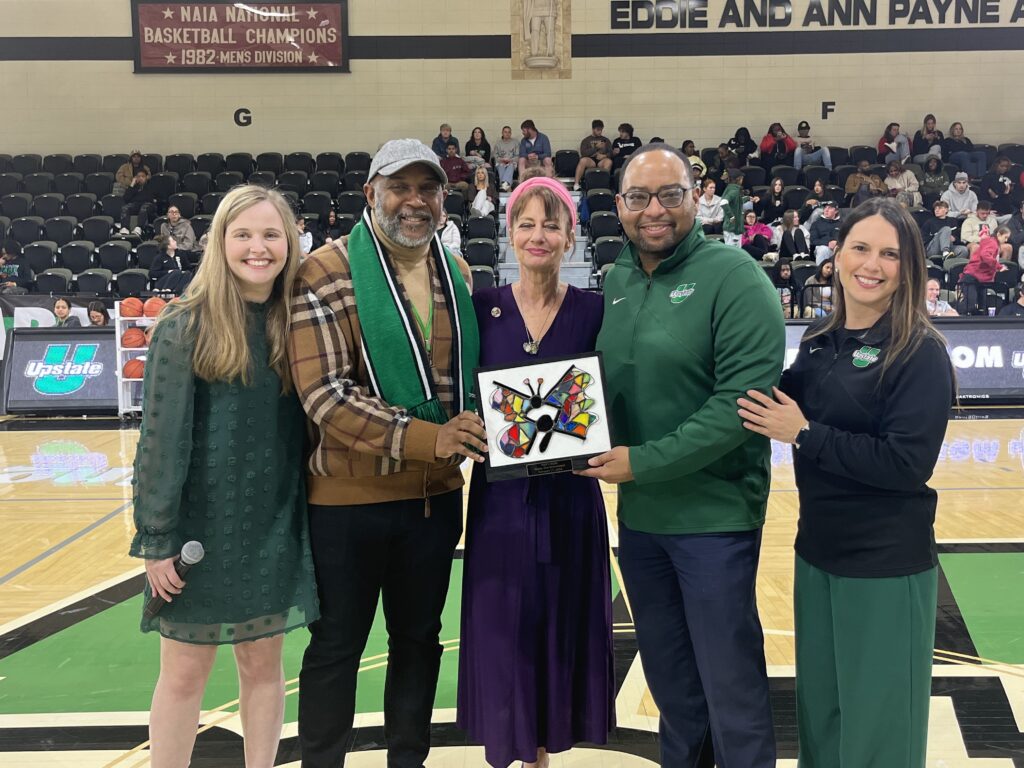
USC Upstate has teamed up with mental health organization Walt’s Waltz as the first university to receive its Stigma-Free Environment designation.
Campus leaders celebrated the recognition during halftime of the men’s basketball game on Feb. 17. As part of being a Walt’s Waltz Stigma-Free Environment, “organizations pledge to increase awareness of mental health conditions and promise to work to eliminate stigma and discrimination within their agency and larger community,” according to the website.
Walt’s Waltz is an Upstate South Carolina organization inspired by founder Susan Crooks’ late son, Walt, who was an adjunct instructor at Clemson University. He died by suicide after a 20-year struggle with treatment-resistant anxiety and eventual depression.
“Having USC Upstate become our first campus as a Walt’s Waltz Stigma-Free Environment holds such meaning,” Crooks said. “There are few words to describe my gratitude for all involved in making this happen. Let’s stop dancing around mental health conversations. We hope you will join our dance.”
The idea to seek the Stigma-Free Environment designation was spearheaded by Upstate sophomore Emma Hudson, in collaboration with the Division of Student Affairs and USC Upstate Counseling Services.
“USC Upstate Counseling Services is excited to join forces with Walt’s Waltz in championing a stigma-free campus environment,” said Jennifer Gregory, director of Counseling Services. “Their partnership extends beyond our campus, with invaluable support for the peer wellness coaching program, Spartans Helping Spartans. Together, we are passionately committed to advancing mental health initiatives and fostering a secure, supportive community for all.”
Hudson learned about Walt’s Waltz after meeting Crooks at a Greenville Swamp Rabbits game last fall.
“I was so touched by their story and mission,” Hudson said in an email interview. “I just had a gut feeling that this is something USC Upstate needed to be a part of.”
Hudson became passionate about the issue after her own experiences with mental health. The exercise science major once was a three-sport athlete, playing soccer, volleyball and basketball.
“Sports were my life, and my goal was to play soccer for a D1 college,” she says.
That all changed in March 2018. Hudson says while playing soccer she was kicked in the face, which dislocated her jaw. The subsequent diagnoses of a concussion and post-concussion syndrome meant she experienced symptoms for a year.
“This was my introduction to the true meaning of mental health. I had always heard the term, but never understood what it meant. I was left without something that had been one of my main focuses since I was little.
“Due to the injury, I also lost my ability to read, and it took about six months of me going to physical therapy to relearn how to read,” she continued. “After this, I had to have jaw surgery and was medically ineligible to play sports again.”
But she says she had an “amazing support system and was able to channel my new anxiety into a positive spin for mental health.” It’s why she has a job in sports and wants to help others.
She works as an entertainment assistant with the Swamp Rabbits. On campus, she serves multiple roles in the Athletics Department. She is also a Chancellor Ambassador and Student Ambassador.
Tierney Bates, vice chancellor for Student Affairs, said the Walt’s Waltz partnership is an important addition to the mental health resources USC Upstate offers students.
“Through dialogue, trainings, workshops, and self-care tips, we will truly build a culture of care at Upstate and contribute to ending stigmas around mental health conditions,” Bates said.
The ability to help the campus community – current and future Spartans alike – is what gives Hudson joy.
“I hope that each person who is struggling realizes that they aren’t alone and that USC Upstate is here for them,” she said. “I am so proud to be a Spartan. I couldn’t have asked for a better place to learn, grow, and serve!”
USC Upstate offers counseling services, medication management, psychological testing, and outreach services, along with 24/7 after-hours crisis support for enrolled students. Contact Counseling Services at 864-503-5195 or email: [email protected].
Community Resources: Spartanburg Area Mental Health Center: (864) 585-0366
Spartanburg Area Mental Health Center (sparmhc.org)
Mental Health Resources: 988 Suicide and Crisis Lifeline. Provides 24/7 free and confidential support for people in distress, prevention and crisis resources. (Call & Text Support)
988 Suicide & Crisis Lifeline – Call. Text. Chat. (988lifeline.org)
